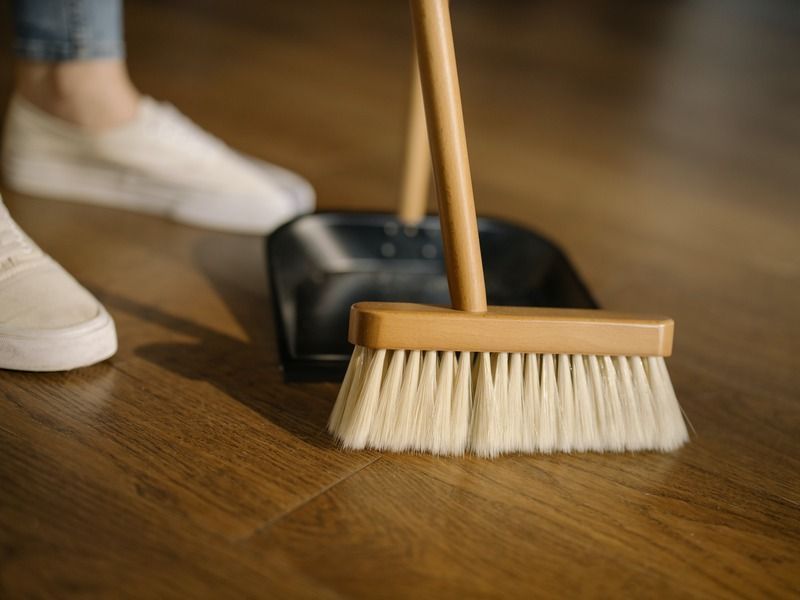Dust free homes fight allergens
Many of us suffer from seasonal allergies. Most common allergens, such as dust mites and pet dander, are often found in the dust particles that accumulates in our homes, In order to manage your symptoms better, it is important to keep a clean environment. We'll explain why it's important to keep your home clean and provide practical tips for doing so.
1. What are allergens and how are they triggered?
Allergens are any substances that cause allergic reactions in people. Allergens are a form of antigen, which are substances that produce an immune reaction. They can come from a various sources, including pollen, mold, pet dander, and dust mites. In fact, dust particles are one of the most common sources of indoor antigens. When you clean, particles can be released into the air and inhaled, triggering dust allergy reactions such as sneezing, coughing, and wheezing.
Treating dust mite allergies might feel like an uphill battle.
Some people are more sensitive to certain allergens than others, and may experience more severe symptoms. For example, individuals with asthma may experience more frequent and severe asthma attacks when exposed to dust particles and other allergens. It's important to take steps to reduce your exposure to antigens in order to prevent these symptoms and protect your health.
2. Why is it Important to Keep Your Home Dust-Free?
Exposure to dust and allergens can cause a range of health problems, including allergies and asthma attacks. By keeping your home clean, you can reduce your risk of these health problems and improve your overall well-being. A clean house can also help you sleep better, lower stress, and improve your mood.
In addition to these health benefits, there are several other reasons why it's important to keep your home dust-free. For example, a clean home is more welcoming, and can make a great impression on guests. A tidy living space can also help to reduce stress and improve mental clarity, making it easier to focus on work and other tasks.
3. How to Keep Your Home Dust-Free
Here are some practical tips for keeping your home clean and treating dust allergy symptoms:
- Vacuum regularly, using a vacuum with a HEPA filter: Vacuuming is one of the best ways to keep your home dust free and get rid of allergens from your carpets and other surfaces. Be sure to use a vacuum with a high-efficiency particulate air (HEPA) filter, which can trap even the smallest particles of dust and allergens.
- Use air purifiers to remove airborne antigens: Air purifiers can be a great way to remove antigens from the air in your home. Look for a purifier with a HEPA filter, which can trap particles as small as 0.3 microns.
- Wash bedding and curtains regularly in hot water: Dust mites and allergens can accumulate on bedding and curtains, so it's important to wash them regularly in hot water to kill off any dust mites or other antigens.
- Dust furniture, electronics, and other surfaces frequently using a microfiber cloth: Use a microfiber cloth to dust your furniture, electronics, and other surfaces regularly. Microfiber is effective at trapping dust particles and allergens, and can be washed and reused multiple times.
- Remove clutter and excess items that can collect dust: Clutter can make it difficult to keep your home clean and dust-free. Try to remove excess items that can collect dust particles, and keep surfaces clear of clutter.
- Use natural cleaning products that are safe for people with allergies: Many cleaning products contain harsh chemicals that can trigger allergic reactions in some people. Look for natural alternatives
The tips mentioned can help reduce your exposure to dust particles and allergens in your home, and improve your overall health and well-being. Remember that keeping your home clean and dust-free is an ongoing process, and it may take some time and effort to establish a routine that works for you.
In addition to following the tips outlined, there are other steps you can take to reduce your exposure to allergens, such as wearing a mask while cleaning or spending time outdoors, avoiding certain foods that can trigger allergies, and using allergy medication as directed by your doctor. By taking a comprehensive approach to managing your allergies, you can minimize your symptoms and improve your overall quality of life.
Reducing your exposure to dust particles and allergens in your home can be especially important for those who suffer from seasonal allergies, asthma, or other respiratory conditions. If you find that your symptoms persist even after taking steps to reduce antigens in your home, it may be worth seeking professional help from a doctor or allergist. They can help identify specific antigens that are triggering your symptoms and recommend personalized strategies for managing them.
Whether you suffer from allergies or simply want to create a clean, welcoming living space, the benefits of keeping your home dust-free are clear. By taking steps to reduce your exposure to antigens and other harmful substances, you can improve your health, reduce stress, and create a comfortable and inviting home that you can be proud of. So start today, and make dust-free living a priority for yourself and your family.

Give us a call today!
We would love to help you schedule a convenient time that fits your schedule.
Location
Call
Sparkle Squad
Making homes spotless since 2010
Navigation
Working hours
- Mon - Wed
- -
- Thu - Sat
- -
- Sunday
- -
All Rights Reserved | Company Name | Powered by Snapps
